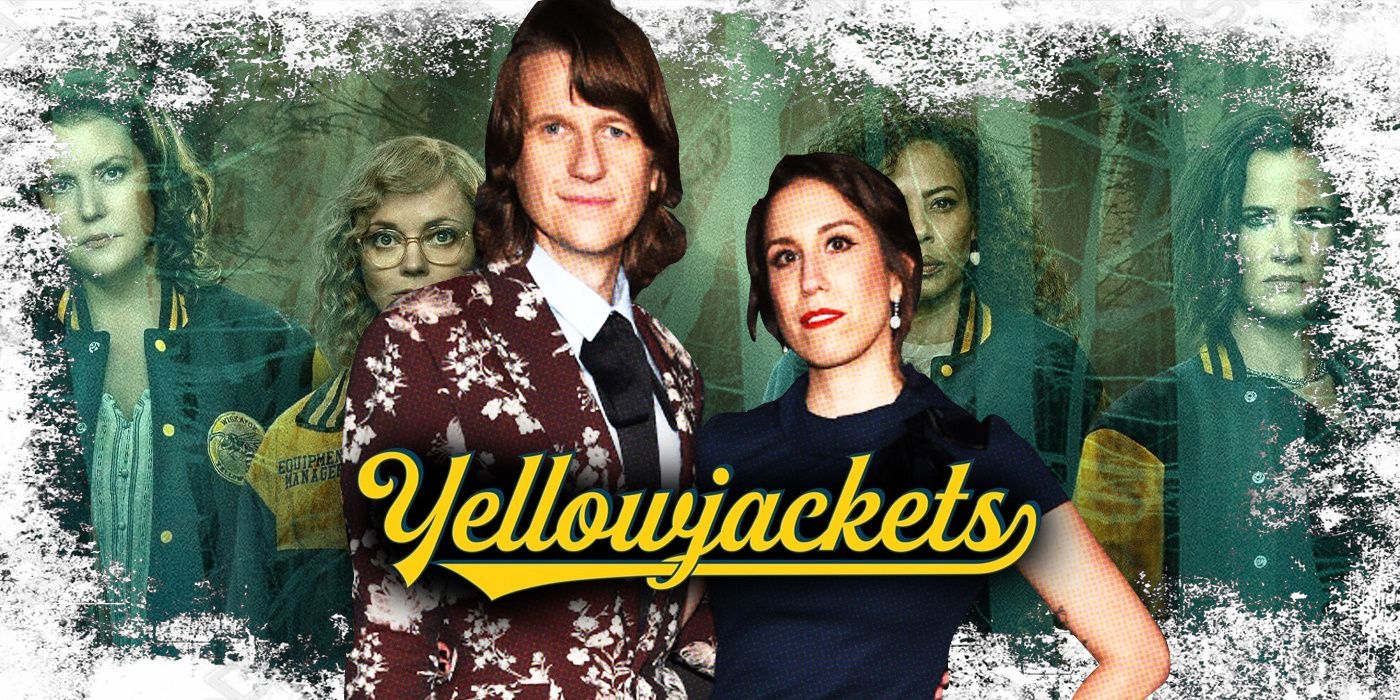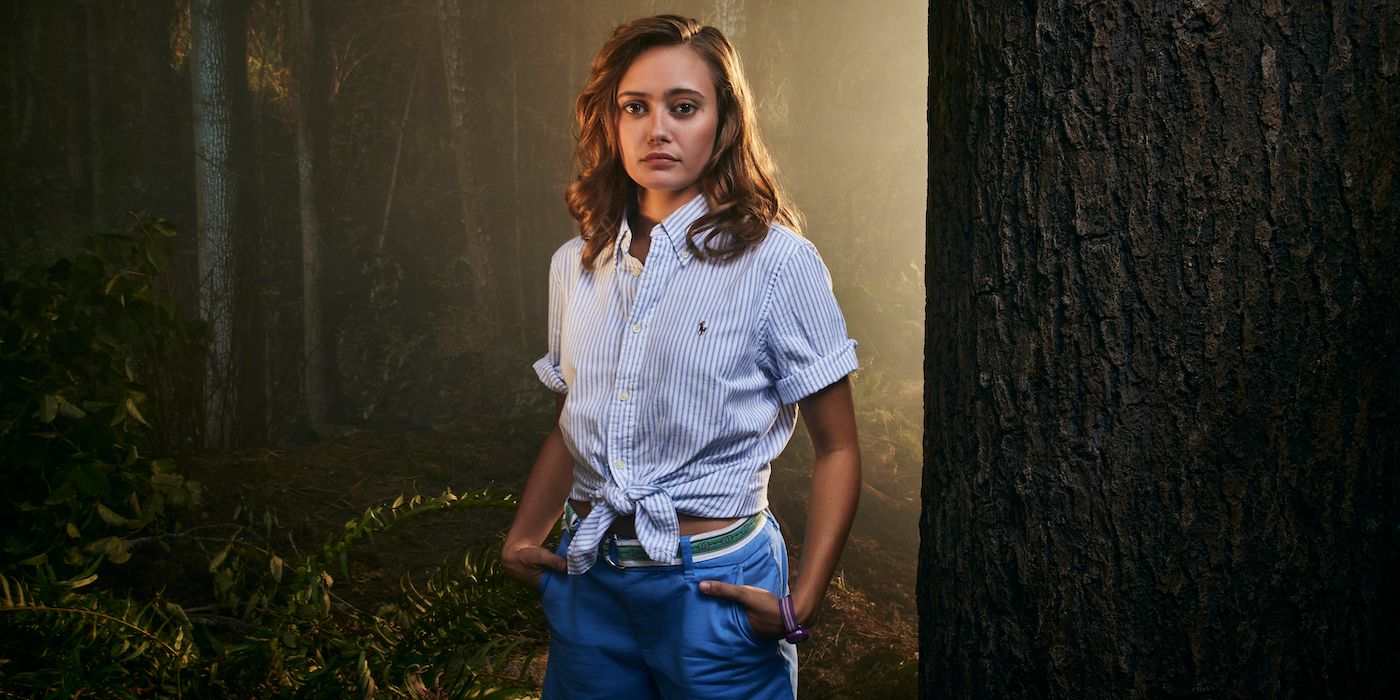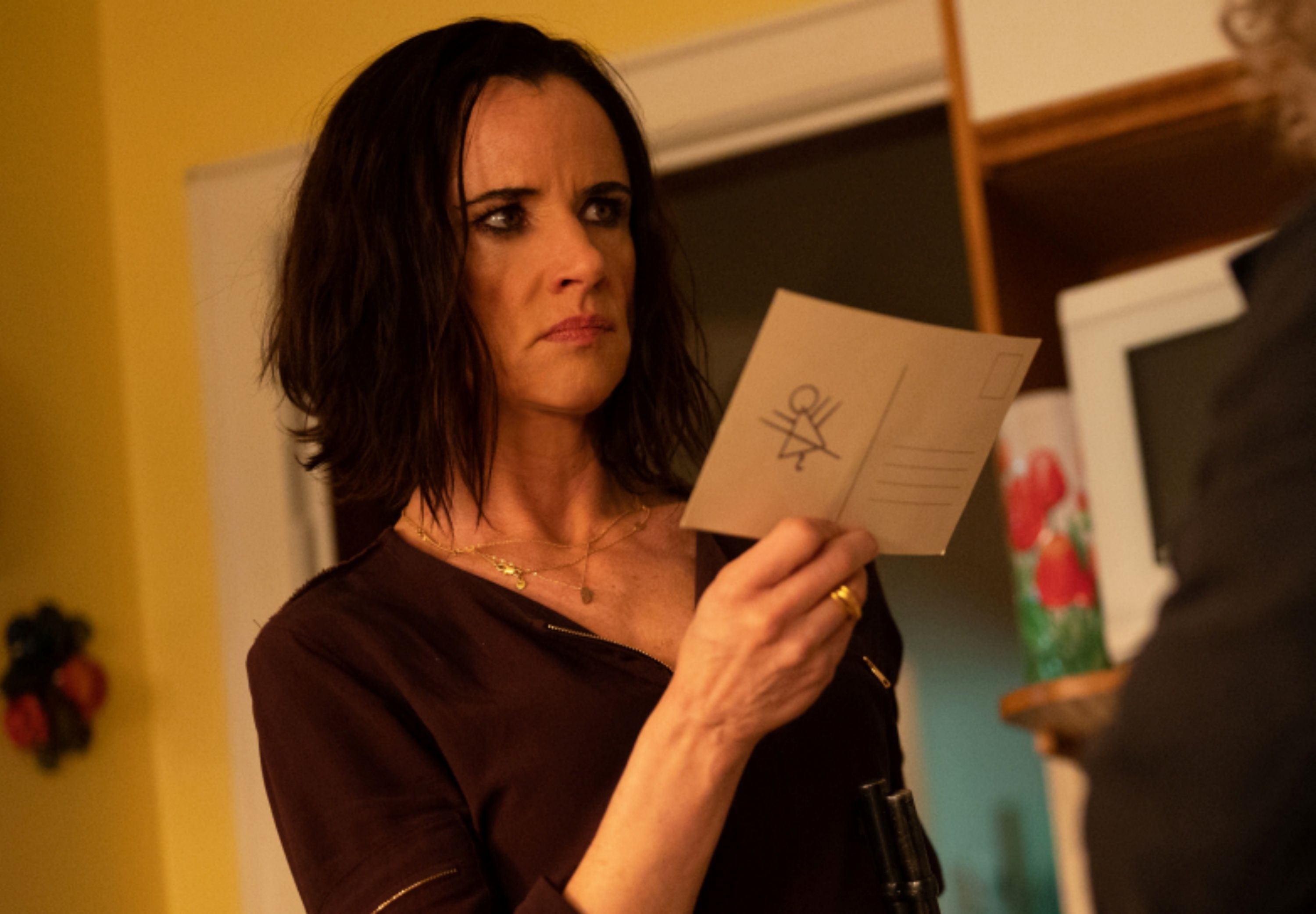Editor's note: The below interview contains spoilers for the Season 1 finale of Yellowjackets.
The Showtime series Yellowjackets successfully wears a lot of different hats (or letterman jackets), so to speak. Part-coming-of-age story, part-psychological thriller, the show revolves around a high school girls' soccer team who finds themselves unexpectedly stranded in the Canadian wilderness after a plane crash — and what they're forced to resort to in order to survive until their rescue. Simultaneously, the series checks in with the survivors of the event 25 years later, as the now-adult versions of these girls not only cope with the lingering trauma of what really happened out there in those woods but are confronted with new mysteries, including someone who might be poking around and getting too close to uncovering the truth of their past. The show stars Melanie Lynskey, Christina Ricci, Juliette Lewis, Tawny Cypress, Ella Purnell, Sophie Nélisse, Jasmin Savoy Brown, Sophie Thatcher, Sammi Hanratty, Steven Krueger, Courtney Eaton, Jane Widdop, Kevin Alves, Sarah Desjardins, Liv Hewson, Rekha Sharma, Peter Gadiot, and Warren Kole.
Ahead of the Season 1 finale, "Sic Transit Gloria Mundi," Collider had the chance to chat with Yellowjackets creators and showrunners Ashley Lyle and Bart Nickerson about some of the episode's most pivotal moments. In the interview, which you can read below, they discuss paying attention to fan theories online, collaborating with Blair Witch Project co-director Eduardo Sánchez on the finale, why Jackie had to die and how that arc was included in their initial pitch, and how they considered putting that ending Lottie reveal much earlier in Season 1. They also talk about the threat that Lottie's "wellness group" will pose for Natalie and the rest of the survivors heading into Season 2, whether they've adjusted their initial five-season plan since the show started airing, and more.
Collider: This show lends itself to constant discussion. But I also feel like the discussion is just evolving all the time. I don't know how online the two of you are, or if you've seen a lot of the crazy fan theories circulating around.
ASHLEY LYLE: I would describe myself as far too online. Definitely seen some of the fan theories. It's funny to me that a lot of people have asked, "Have you looked at Twitter? Have you looked at Reddit?" I don't know what kind of willpower other people have, that they might be able to not do that. But I am definitely not that person.
BART NICKERSON: I would say that I'm not super online. I tried being online for a month, five years ago, and I was just like... I have some friends who have had that experience of — they did cocaine once and were just like, "This will destroy my life. I can never do this again." So, that was kind of how I felt about being online. I guess I actually have the perfect situation now, because Ashley's very online, and she can sort of keep me abreast of things. So she'll show me memes or show me comments and stuff. But as long as I don't touch the phone, get sucked in. So I can see it and be happy about it, but then I don't have to chase it.
Right. She's like your Twitter buffer. I do want to ask about Eduardo Sánchez directing this episode, which I think a lot of people who are also Blair Witch fans especially are super excited about. So I'm just curious how he came on board.
LYLE: Yeah. We were so incredibly excited to work with Ed. He made a movie that was absolutely formative, I think, to both of us. It was just such a revelation. I saw it in the theater when it first came out and was absolutely haunted by the final 10 minutes of that movie.
NICKERSON: Oh, my God.
LYLE: The rest of my life, still haunted.
NICKERSON: I can remember walking out of the theater after that movie and telling my friends, "I know you guys think you're hilarious, but if any one of you is standing in the corner of a room that I walk into, we are not friends. I will not be able to handle it. I will be just too devastated and terrified."
LYLE: It came together pretty organically, in terms of his interest in working with us and our interest in working with him. To some extent, it was just serendipitous that the timing of everybody's schedules worked out, that he was available for the finale. He was fantastic, just so collaborative, so willing to sort of dive into our world. He's just such a master of dread. That was something that was really important to us to infuse the finale with throughout. So, we're just so excited with how it turned out and what he contributed to it.
There are a lot of questions that get answered [in the finale], but then also just as many more that get raised. And one of the answers that we get is what happens to Jackie, definitively. I wondered about the decision to put her death there. Was there a part of you that considered maybe teasing that thread out a little bit longer? What was the thinking behind making that one of the big reveals this season?
NICKERSON: That was actually something that was a part of the show very early. Jackie's death was actually how we ended a 35-minute tightly scripted pitch that we did for what feels like 2,000 people. It was actually something even back when the show and that pitch were just sort of conversations that Ashley and I were having. The idea of having this character that very much represents someone who has been very shaped by society and culture, and also in a certain sense, rewarded for sort of toeing that party line. Although, it's a very fraught kind of reward as we, hopefully, were able to sort of show.
But to have that person die at the end of the first season to draw a line, to show where home has fallen away, was something that we thought would just be very important for the show, and to give such a visceral emotional reaction to it, and to very much have that Shauna/Jackie story be the emotional spine to a certain extent of that '96 story. Really feeling like that had to be something that didn't get dragged out. We never want to drag anything out. Some things maybe take longer than we had hoped or thought or moved more quickly. But this one really felt like it fit as a first season. So not standalone, but there was a journey there. It felt like it was an appropriate place to bring that to an end.
LYLE: Like Bart said, that was part of the original pitch, her dying at the end of the first season the way that she does. Ella came into the role knowing that that was the case. And then, of course, she's just so talented and so phenomenal in this part, that naturally at a certain point, we're going, "Oh, my God, does she have to die in the first season?" Because Ella's just so good. But that's a case of sometimes having to have a certain amount of discipline, even for ourselves as writers and creators, and knowing that it really was for us the right time for this to happen. And that's not to say that Jackie won't loom large or continue to be a part of their experience moving forward.
We also knew that we wanted Jackie's death to be horrific in a certain way, but also really heartbreaking and really emotional. She serves not just to provide this symbolic death as Bart said, which is very much part of it, but also really change the other characters. So ultimately, it's the preventability of her death [that] was really important to us, these really minute decisions. Shauna and Jackie's mutual pride and their mutual stubbornness and their refusal to just cross that line and come back to each other. And had that happened back home, the consequences obviously would've been incredibly different. In terms of just every single character's complicity in her death, without it being an active malicious choice, [it] felt like a great step in terms of the evolution of these characters and where they're eventually going.
You talked before about how that was a part of your initial pitch. Were there were any unexpected storylines or plot threads that emerged while you were breaking the season that weren't always present?
LYLE: One thing that's interesting is, and it's less something brand new but more what Bart was saying about how things tend to sometimes expand or contract or accordion. And we always knew that introducing the presence as we do at the end of the finale, of Lottie as a present-day survivor, was something that we wanted to do. But it actually moved around a little bit over the course of the season. Ultimately, we wanted to be able to really tell that story in full as sort of a new chapter. So I think that we wrote her introduction a couple of times, and then ended up feeling like it was just too soon, too much. We had to let the other stories come to their own... if not conclusion, then fulcrum point or turning point, before we could introduce [Lottie] and really pay her her full due on Season 2.
That definitely brings me to my next question, which is the big reveal that Lottie is part of or has started a cult, or some group that is clearly going to be a huge part of the show.
NICKERSON: A wellness group, a really supportive wellness group.
LYLE: Very well-intentioned. Bart and I, we watched so many cult documentaries well before we started making this show, and there's always this point, I feel like early on... there's this great one about the Source Family in Los Angeles. I feel like, in every cult documentary for a little bit, you're like, "Oh man, they did it. It's a good one. This one seems pretty great. This one seems totally legit." And then you're like, "Oh no, it's horrible."
Were they the ones responsible for those postcards that were being sent around? What kind of complications are Natalie and the others going to face from Lottie as an entity in Season 2?
NICKERSON: I mean, I guess it's always a little tricky because again, we have a high altitude plan and then we're in the early days, but it is such a weird... It's one of the cool parts of television, that you're creating it in parallel to it being consumed to a certain extent. And then just with the way that media is, and the access that people have to these kinds of interviews, we always want to be very careful to not do or say anything that ends up diminishing the final product, because things do shift and they do move. So, just wanting to be very careful about not saying a thing. There's obviously spoilers, but then there's also to have a sort of competing version that lives in somebody's mind. I feel like that can sometimes diminish the version that you land on, just because it's like, well, if they had zigged here instead of zagged ...
But that said, I think that the only thing we can definitely say is that what we are seeing in '96 is like the birth of a kind of religiosity among the girls. The person who is the sort of a connector between whatever that is and the team is very much Lottie. Now, we're going to see what has become of that person and how what is formed out there... how a system, I guess, for lack of a better word, has translated back into society and how it has grown and shifted itself in 25 years.
I feel like I had heard at one point that the two of you had pitched a five-season plan. Is that still the plan overall?
LYLE: We did pitch a five-season plan, but the best-laid plans always ... There's always a chance that the show gets canceled. In our ideal world, the story will tell us how long it wants to be. As long as we and our writers are really excited about it and feel like there's just depths to be mined, then we really hope to have the opportunity to keep telling it. As Bart said, one of the craziest parts about television writing, in particular, is that things do tend to expand and contract. I know that it's very typical for a writers' room to come together and break the first 10 episodes, and then you use all of that story by Episode 4. I think that it would be a bit heuristic for us to try to predict exactly how many seasons this will run. Generally speaking, it's sort of an instinctual thing, but you can feel when the story is coming down the home stretch when you're getting to the right points at the right time.
[We] definitely intend to do this for multiple seasons. But could it be three or four? Sure. Could it be six or seven? Who knows? I mean, I'm not sure seven seasons and a movie is what we're going for here. But the important thing is that it unfolds in the most organic way possible and that we're still telling a really dynamic, interesting story.
The first season of Yellowjackets is currently available to both watch and stream on Showtime.



